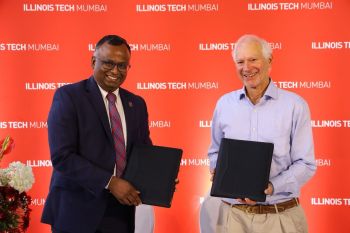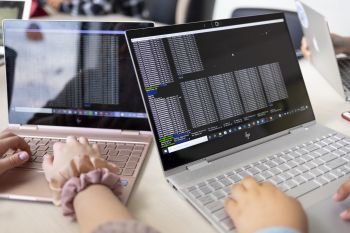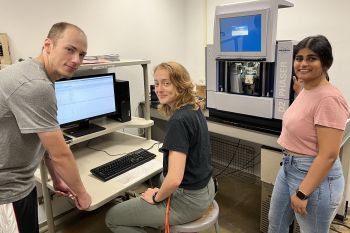Illinois Tech’s CARNATIONS Receives $10M Federal Grant as New Tier 1 Transportation Center to Bolster Cybersecurity in Navigation Systems
Led by Illinois Institute of Technology Professor Boris Pervan, CARNATIONS aims to enhance resilience of transportation infrastructure against cyber threats, developing advanced countermeasures for GPS spoofing and jamming

CHICAGO—May 12, 2023—The Center for Assured and Resilient Navigation in Advanced Transportation Systems (CARNATIONS) at Illinois Institute of Technology (Illinois Tech) was named a new Tier 1 University Transportation Center (UTC) by the United States Department of Transportation. As a Tier 1 UTC, CARNATIONS will receive a $10 million grant for improving transportation navigation systems by making them more resilient to cyber attacks such as spoofing and jamming.
Led by Professor of Mechanical and Aerospace Engineering Boris Pervan, CARNATIONS brings together a consortium of universities to perform transformative research in the area of resilient transportation systems, facilitate technology transfer to public agencies and industry, and advance workforce and educational development.
Interference such as jamming and spoofing that targets critical infrastructure has the potential to cause widespread delays and cascading failures across multiple modes of transportation including ships, trains, trucks, and cars—and the problem is only getting worse.
A major aircraft manufacturer reported more than 10,000 global navigation satellite system (GNSS) interference events in 2021 alone, and repeated spoofing has impacted a range of military operations internationally.
“Whether it’s innovating ways to identify cybersecurity threats to our transportation systems or removing those potential risks, I’m confident that the bright minds at Illinois Institute of Technology and Chicago State University will be working on infrastructure breakthroughs to help protect working families across America, all while creating jobs for the diverse transportation and tech leaders of tomorrow,” says United States Senator Tammy Duckworth (D-Illinois). “I’m proud to have advocated for this project and look forward to this federal investment helping prioritize the advanced transportation that will drive our nation’s future.”
With a broad coalition of university collaborators and industry advisers, Pervan and his team plan to approach the problem from several angles, including developing sophisticated algorithms that can tell the difference between authentic or spoofed GPS signals and improving GPS receivers by combining them with other types of sensors that are immune to jamming and spoofing.
Addressing these problems is essential to intelligent transportation systems that rely on GPS not just for navigation but for control, such as in self-driving cars, which Pervan has experience researching.
CARNATIONS will be looking to the future at the possibility of a fully connected system, where self-driving cars share information with each other and with smart infrastructure such as traffic signals.
“Spoofing vehicles can be very dangerous,” says Pervan. “If you spoof one car and that information gets passed on to others, it’s infecting the whole system. On the other hand, the information from the other vehicles could be of some use to tell you that you’re being spoofed, so right now we have no idea how that trade-off will play out.”
CARNATIONS will create workforce development programs, develop certificates, and prioritize educating the next group of transportation professionals.
In addition to Pervan, Illinois Tech Professor of Mechanical and Aerospace Engineering Matthew Spenko and Research Associate Professor Samer Khanafseh will conduct research through CARNATIONS.
Chicago State University, Stanford University, University of California Riverside, and Virginia Polytechnic Institute and State University are also CARNATIONS consortium members.
“Our nation’s infrastructure increasingly relies on connected and automated technologies, with significant potential cybersecurity risks,” says U.S. Senator Dick Durbin (D-Illinois). “Illinois Institute of Technology will help develop innovative solutions to protect our nation’s transportation infrastructure from cybersecurity risks. This partnership with Chicago State University will train the next generation of engineers on innovative technology to identify, mitigate, and remove cybersecurity risks from our transportation infrastructure.”
Pervan, a foremost expert in his field, was recently awarded the prestigious Johannes Kepler Award by the Institute of Navigation.
Image: An autonomous vehicle guided by satellite navigation requires secure systems to avoid cyber attacks, such as being directed off course by a false GPS signal.
Illinois Institute of Technology
Based in the global metropolis of Chicago, Illinois Tech was born to liberate the collective power of difference to advance technology and progress for all. It is the only tech-focused university in the city, and it stands at the crossroads of exploration and invention, advancing the future of Chicago and the world. It offers undergraduate and graduate degrees in engineering, computing, architecture, business, design, science and human sciences, and law. Illinois Tech students are guaranteed hands-on experiences, personalized mentorship, and job readiness through the university's one-of-a-kind Elevate program. Its graduates lead the state and much of the nation in economic prosperity. Its faculty and alumni built the Chicago skyline. And every day in the living lab of the city, Illinois Tech fuels breakthroughs that change lives. Visit iit.edu.
Armour College of Engineering
Armour College of Engineering has been educating world-class engineers since the university’s founding in 1890. As future engineers who will innovate in the twenty-first century, Armour students learn the principles of the profession and work in an interdisciplinary environment that emphasizes hands-on learning, teamwork, and leadership, all through the lens of our four engineering themes—water, health, energy, and security—that highlight issues vital today and in the future. Armour is home to five departments and nine ABET-accredited undergraduate majors, which provide a wide breadth of exciting programs from which to choose. Illinois Tech alumni have advanced to careers as presidents of companies and professors at major universities—and have become members of the National Academy of Engineering, the highest distinction in the field.
Media contacts
Petra Kelly
Communications Director
Illinois Institute of Technology
Cell: 773-771-1064
petra.kelly@illinoistech.edu
Kevin Dollear
Communications Manager
Illinois Institute of Technology
Cell: 773-860-5712
kdollear@illinoistech.edu




